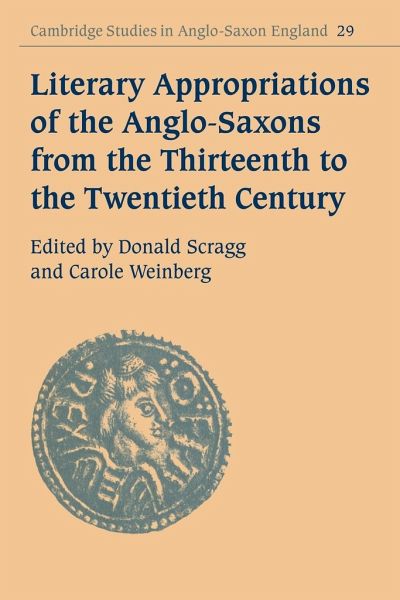
Literary Appropriations of the Anglo-Saxons from the Thirteenth to the Twentieth Century

PAYBACK Punkte
24 °P sammeln!
Studies literary responses towards the Anglo-Saxons from the medieval period to the present.This book discusses the attitudes towards Anglo-Saxons expressed by English poets, playwrights and novelists from the thirteenth century to the present day. The essays are arranged chronologically, tracing literary responses to the Anglo-Saxons in the medieval period, the Renaissance and also the eighteenth and nineteenth centuries. In earlier centuries the Ango-Saxons were often idealized representatives of happier times. Later, they became the epitome of a 'British' race, while an individual Anglo-Sax...
Studies literary responses towards the Anglo-Saxons from the medieval period to the present.
This book discusses the attitudes towards Anglo-Saxons expressed by English poets, playwrights and novelists from the thirteenth century to the present day. The essays are arranged chronologically, tracing literary responses to the Anglo-Saxons in the medieval period, the Renaissance and also the eighteenth and nineteenth centuries. In earlier centuries the Ango-Saxons were often idealized representatives of happier times. Later, they became the epitome of a 'British' race, while an individual Anglo-Saxon, King Alfred, was inflated into a national hero. A final essay suggests the disappearance of any clear sense of the cultural roots of the English in the twentieth century. The contributors, who are specialists in their respective fields from Britain and the United States, draw on works that have frequently been ignored or overlooked. They address topical issues such as nationalism, cultural identity, myth, gender and contextualization.
Review quote:
"This book provides us with a much fuller and more colorful sense of people's changing views of Anglo-Saxondom over the centuries."
Speculum
"The volume includes convenient indexes and is carefully documented throughout...consistently high editorial quality...Anglo-Saxonists and others can profiably open this collection at any points of particular interest, or they can read it straight through for a well-guided topical excursion through eight centuries of English literature."
Carl T. Berkhout, Journal of English and Germanic Philology
Table of contents:
List of contributors; Acknowledgements; List of abbreviations; Introduction: the Anglo-Saxons: fact and fiction Donald Scragg; 1. Victor and victim: a view of the Anglo-Saxon past in Lazamon's Brut Carole Weinberg; 2. Kings, constitution and crisis: 'Robert of Gloucester' and the Anglo-Saxon remedy Sarah Mitchell; 3. The South English Legendary: Anglo-Saxon saints and national identity Jill Frederick; 4. King AElle and the conversion of the English: the development of a legend from Bede to Chaucer John Frankis; 5. Saxons versus Danes: the anonymous Edmund Ironside Leah Scragg; 6. New times and old stories: Middleton's Hengist Julia Briggs; 7. Crushing the convent and the dread Bastille: the Anglo-Saxons, revolution and gender in women's plays of the 1790s Jacqueline Pearson; 8. Anglo-Saxon attitudes?: Alfred the Great and the Romantic national epic Lynda Pratt; 9. 'Utter indifference?': the Anglo-Saxons in the nineteenth-century novel Andrew Sanders; 10. The charge of the Saxon brigade: Tennyson's Battle of Brunanburh Edward B. Irving Jr; 11. Lady Godiva Daniel Donoghue; 12. The undeveloped image: Anglo-Saxon in popular consciousness from Turner to Tolkien T. A. Shippey; Indexes.
This book discusses the attitudes towards Anglo-Saxons expressed by English poets, playwrights and novelists from the thirteenth century to the present day. The essays are arranged chronologically, tracing literary responses to the Anglo-Saxons in the medieval period, the Renaissance and also the eighteenth and nineteenth centuries. In earlier centuries the Ango-Saxons were often idealized representatives of happier times. Later, they became the epitome of a 'British' race, while an individual Anglo-Saxon, King Alfred, was inflated into a national hero. A final essay suggests the disappearance of any clear sense of the cultural roots of the English in the twentieth century. The contributors, who are specialists in their respective fields from Britain and the United States, draw on works that have frequently been ignored or overlooked. They address topical issues such as nationalism, cultural identity, myth, gender and contextualization.
Review quote:
"This book provides us with a much fuller and more colorful sense of people's changing views of Anglo-Saxondom over the centuries."
Speculum
"The volume includes convenient indexes and is carefully documented throughout...consistently high editorial quality...Anglo-Saxonists and others can profiably open this collection at any points of particular interest, or they can read it straight through for a well-guided topical excursion through eight centuries of English literature."
Carl T. Berkhout, Journal of English and Germanic Philology
Table of contents:
List of contributors; Acknowledgements; List of abbreviations; Introduction: the Anglo-Saxons: fact and fiction Donald Scragg; 1. Victor and victim: a view of the Anglo-Saxon past in Lazamon's Brut Carole Weinberg; 2. Kings, constitution and crisis: 'Robert of Gloucester' and the Anglo-Saxon remedy Sarah Mitchell; 3. The South English Legendary: Anglo-Saxon saints and national identity Jill Frederick; 4. King AElle and the conversion of the English: the development of a legend from Bede to Chaucer John Frankis; 5. Saxons versus Danes: the anonymous Edmund Ironside Leah Scragg; 6. New times and old stories: Middleton's Hengist Julia Briggs; 7. Crushing the convent and the dread Bastille: the Anglo-Saxons, revolution and gender in women's plays of the 1790s Jacqueline Pearson; 8. Anglo-Saxon attitudes?: Alfred the Great and the Romantic national epic Lynda Pratt; 9. 'Utter indifference?': the Anglo-Saxons in the nineteenth-century novel Andrew Sanders; 10. The charge of the Saxon brigade: Tennyson's Battle of Brunanburh Edward B. Irving Jr; 11. Lady Godiva Daniel Donoghue; 12. The undeveloped image: Anglo-Saxon in popular consciousness from Turner to Tolkien T. A. Shippey; Indexes.




